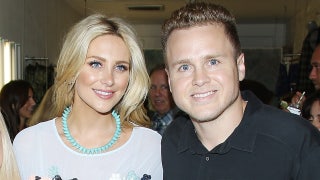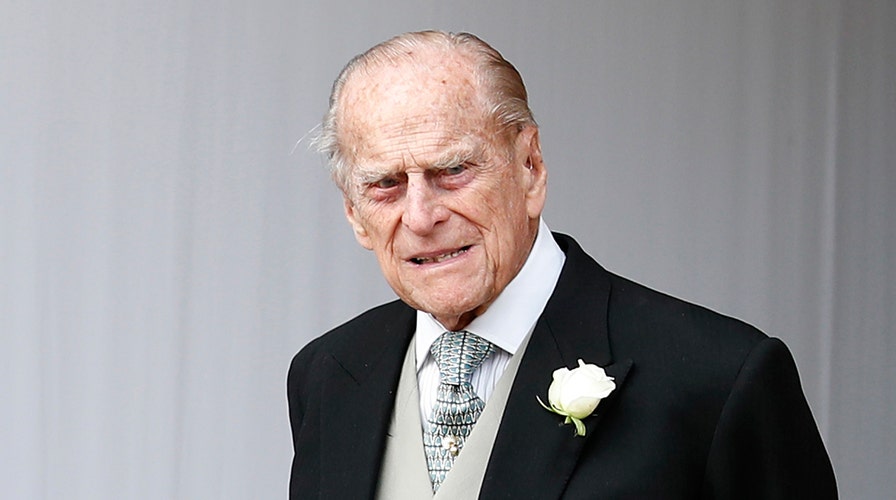Prince Phillip dies at age 99
The Duke of Edinburgh Prince Philip, husband of Britain's Queen Elizabeth, has passed away.
Prince Philip, Duke of Edinburgh and Queen Elizabeth II’s husband of 73 years, died on Friday at Windsor Castle. He was 99.
The royal family confirmed the Duke of Edinburgh's death on Friday in a statement.
"It is with deep sorrow that Her Majesty The Queen has announced the death of her beloved husband, His Royal Highness The Prince Philip, Duke of Edinburgh. His Royal Highness passed away peacefully this morning at Windsor Castle," the statement reads.
POLICE CALLED TO MEGHAN MARKLE, PRINCE HARRY’S CALIFORNIA MANSION NINE TIMES IN AS MANY MONTHS
An announcement about Philip's death was placed on the gates of Buckingham Palace on Friday.
During England’s coronavirus lockdown, he had been staying at Windsor Castle, west of London, with the queen, 94.
On Feb. 16, Philip was admitted to a London hospital after feeling unwell. On March 3, he underwent a procedure for a pre-existing heart condition at St. Bartholomew’s Hospital before being transferred back to King Edward VII hospital on March 5 and ultimately released home on March 16.
Philip married then-Princess Elizabeth in 1947 and is the longest-serving royal consort in British history. He and the queen have four children, eight grandchildren and 10 great-grandchildren.
PRINCE PHILIP RECOVERING AFTER HEART SURGERY, BUCKINGHAM PALACE SAYS
A former naval officer and keen polo player, Philip enjoyed robust health well into old age but had several health issues in recent years.
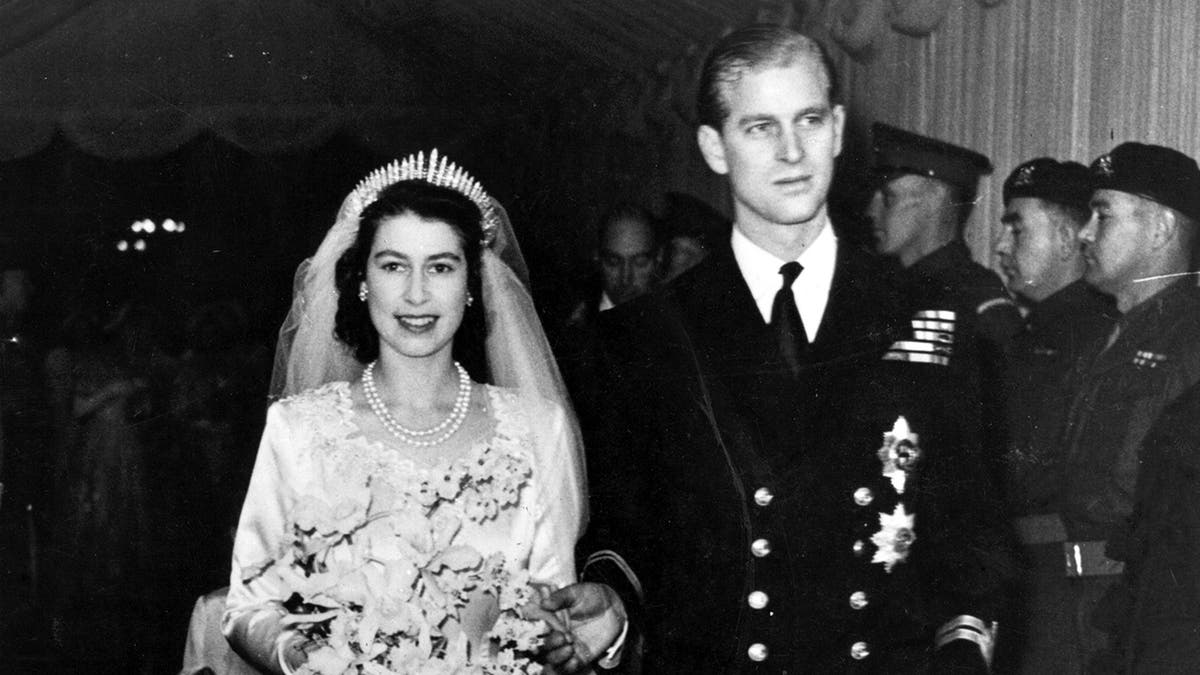
Queen Elizabeth II, as Princess Elizabeth, and her husband the Duke of Edinburgh, styled Prince Philip in 1957, on their wedding day. She became queen on her father King George VI's death in 1952. Philip died Friday at the age of 99. (Hulton Archive/Getty Images, File)
In 2011, he was rushed to a hospital by helicopter after suffering chest pains and treated for a blocked coronary artery. In 2017, he spent two nights in the King Edward Hospital and was hospitalized for 10 days in 2018 for a hip replacement.
Philip was last hospitalized in December 2019, spending four nights in the King Edward Hospital for what the palace said was planned treatment of a pre-existing condition.
He was forced to give up driving at the age of 97, after smashing into a car while driving a Land Rover near Sandringham estate in January 2019. Philip needed help to get out of the Land Rover but wasn’t injured. A woman in the other vehicle suffered a broken wrist.
In a rare interview for a television documentary to mark his 90th birthday in June 2011, he said, "I reckon I've done my bit. I want to enjoy myself for a bit now. With less responsibility, less rushing about, less preparation, less trying to think of something to say.
"On top of that, your memory's going. I can't remember names. Yes, I'm just sort of winding down."
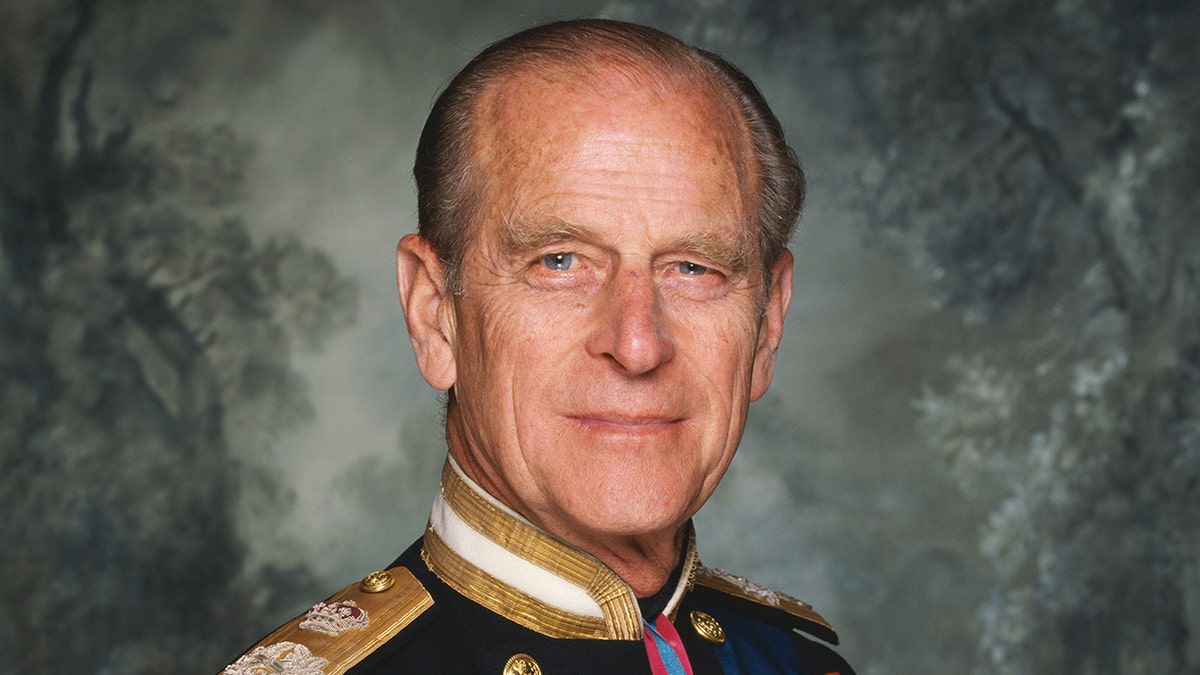
HRH Prince Philip, Duke of Edinburgh, wearing his military dress uniform, circa 1990. (Terry O'Neill/Iconic Images/Getty Images, File)
At the time of his death, Philip's full title was His Royal Highness Prince Philip, Duke of Edinburgh, Earl of Merioneth and Baron Greenwich, Knight of the Garter, Knight of the Thistle, Order of Merit, Knight Grand Cross of the Order of the British Empire, Companion of the Order of Australia, Companion of the Queen's Service Order, Privy Counselor.
He was the second person ever to bear the title "Duke of Edinburgh," the first being his great-great-uncle, Prince Alfred Ernest Albert. His son, Prince Edward, will now assume the title.
Although he married into the British monarchy, royalty was in Philip's blood since birth. On June 10, 1921, he was born Prince Philip of Greece and Denmark – the only son of Prince Andrew of Greece and Princess Alice of Battenberg, as well as the great-great-grandson of Queen Victoria.
Philip's deep-seated royal roots placed him in the line of succession to the thrones of 16 countries.
At 18, Philip joined the navy and shortly afterward met his bride-to-be when the then-13-year-old Elizabeth toured the Royal Naval College with her family. The pair began exchanging letters and fell in love, their romance strengthening while Philip served overseas during World War II.
After the war, King George VI granted the couple permission to wed. Before walking down the aisle at Westminster Abbey, Philip renounced his Greek and Danish royal titles, converted to Anglicanism, and became a naturalized British subject. In addition, he adopted the surname Mountbatten from his British maternal grandparents.
The Mountbatten surname stirred up a bit of controversy after Elizabeth ascended to the throne in 1952. Upon marriage, the new Queen typically took her husband's last name. This did not sit well with Elizabeth's paternal grandmother, who wanted to maintain the family name.
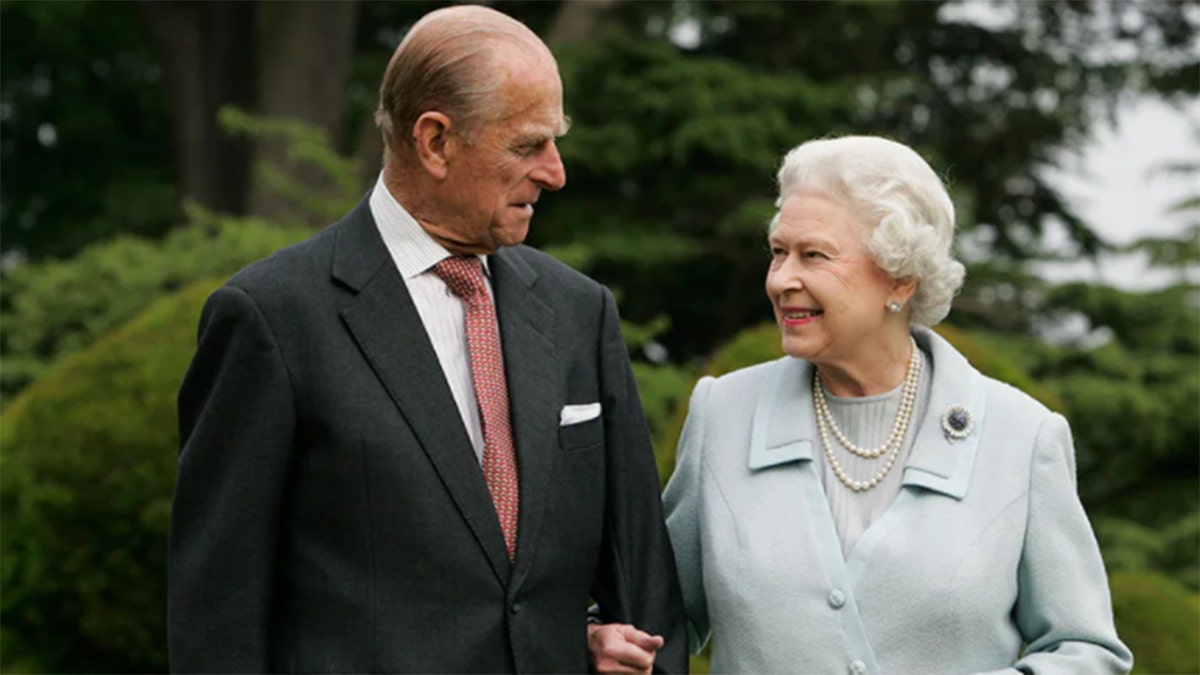
In this image, made available November 18, 2007, HM The Queen Elizabeth II and Prince Philip, The Duke of Edinburgh, re-visited Broadlands to mark their Diamond Wedding Anniversary on November 20. The royals spent their wedding night at Broadlands in Hampshire in November 1947, the former home of Prince Philip's uncle, Earl Mountbatten. (Tim Graham/Getty Images, File)
A royal proclamation was then issued declaring that the royal house would remain known as the House of Windsor. Philip reportedly privately grumbled about not being able to give his name to his children.
Several years after Queen Mary's death, Elizabeth declared that the surname of her and Philip's male-line descendants would be Mountbatten-Windsor. She also announced that Philip was to have "place, preeminence and precedence" next to her "on all occasions and in all meetings, except where otherwise provided by Act of Parliament."
Philip became consort when his wife assumed the throne, and at his death was the longest-serving consort in British history.
During his time in the public eye, Philip was known for his seemingly tactless, off-the-cuff remarks. He once told a British student in China, "If you stay here much longer, you will go home with slitty eyes," and asked the singer Tom Jones, "Do you gargle with pebbles to sing that way?"
To a young boy who said he wanted to be an astronaut, Philip remarked, "You could do with losing a bit of weight," and to the president of Nigeria, dressed in traditional costume, "You look like you're ready for bed."
In March 2012 he asked a disabled man on a mobility scooter, "How many people have you knocked over this morning on that thing?"
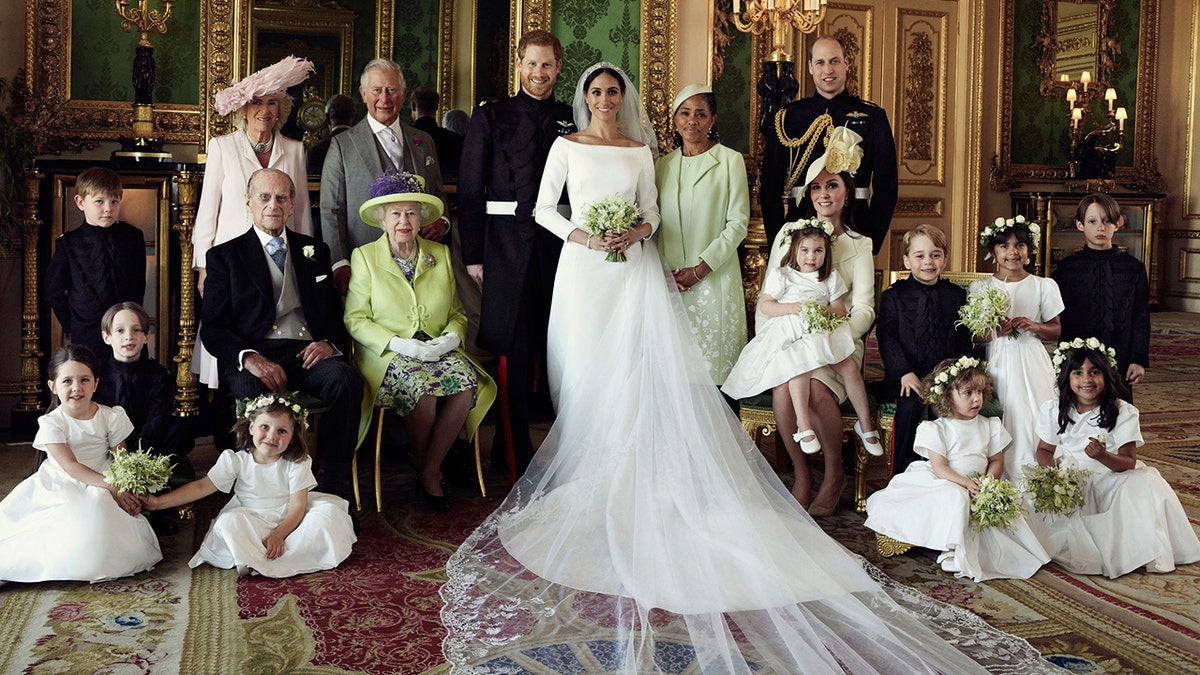
An official wedding photo of Britain's Prince Harry and Meghan Markle, center, in Windsor Castle in 2018. Others in photo from left, back row, Jasper Dyer, Camilla, Duchess of Cornwall, Prince Charles, Doria Ragland, Prince William; center row, Brian Mulroney, Prince Philip, Queen Elizabeth II, Kate, Duchess of Cambridge, Princess Charlotte, Prince George, Rylan Litt, John Mulroney; front row, Ivy Mulroney, Florence van Cutsem, Zalie Warren, Remi Litt. (Alexi Lubomirski/Kensington Palace via AP, File)
At the same time, Philip was actively involved in a wide variety of causes and was patron or president of more than 750 organizations.
He was a particularly prominent advocate for environmental awareness. After visiting Antarctica and the South Atlantic in 1956-57, Philip devoted himself to raising awareness of the public's relationship to the environment.
He served as the first president of the World Wildlife Fund (WWF) from 1961 to 1982, international president of the WWF from 1981 to 1996, as well as president emeritus of the WWF thereafter.
Throughout his career, Philip also visited research stations, laboratories, coal mines and factories to better understand and improve British industrial life. He was a patron of the Work Foundation, sponsoring six conferences on the human problems of industrial communities within the Commonwealth.
Philip was greatly involved in charities that specifically focused on scientific and technological research, as well as the environment and sports.
Between 1959 and 2011, the Duke chaired the judging panel for The Prince Philip Designers Prize, which honored the innovation and creativity of designers and engineers determined to enhance daily life. According to the palace, winners included product designer Sir James Dyson, architect Lord Foster (designer of 30 St Mary Axe, the London skyscraper known as "The Gherkin"), and Andrew Ritchie, inventor of the Brompton folding bicycle.
The Prince also took an interest in the development of youth, creating his own awards program for young people in 1956 with the collaboration of German educator Kurt Hahn and Lord Hunt, leader of the first successful ascent of Everest. The Duke of Edinburgh Award, also known as the Gold Award, is recognized as the world’s leading youth achievement award. It is given to young men and women who exhibit exceptional promise. More than 40 million people in more than 140 countries have participated in the program.
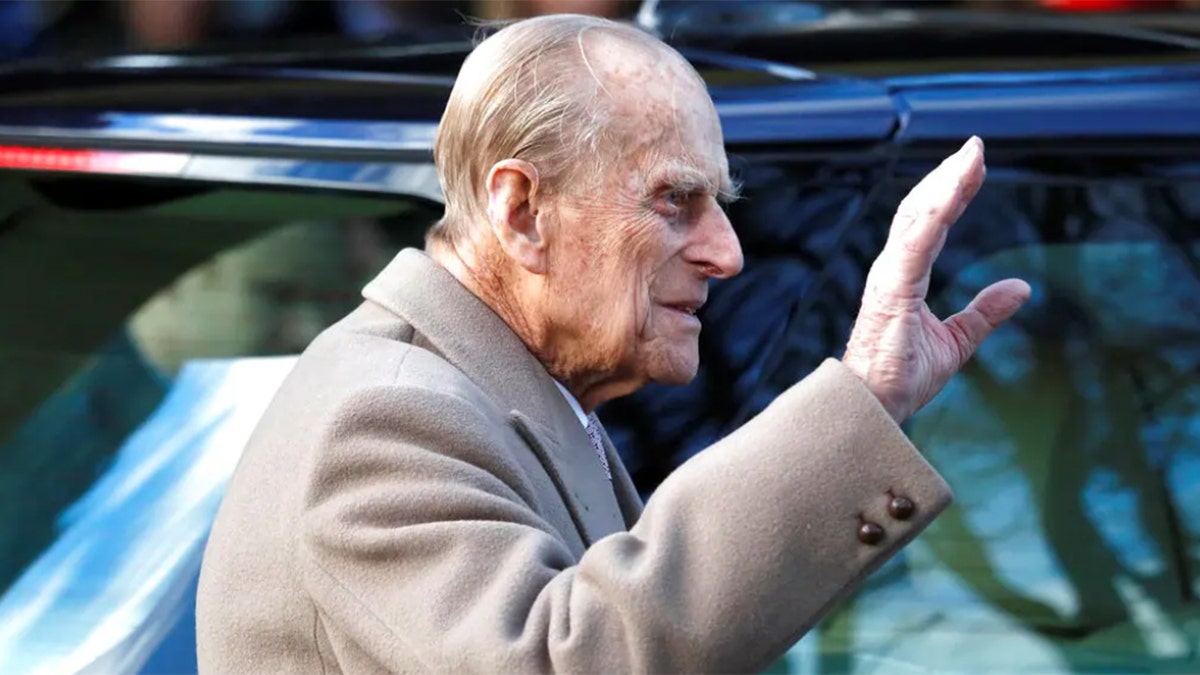
On Feb. 16, Philip was admitted to a London hospital after feeling unwell. On March 3, he underwent a procedure for a pre-existing heart condition at St. Bartholomew’s Hospital before being transferred back to King Edward VII hospital on March 5 and ultimately released home on March 16. (AP/Kirsty Wigglesworth, File)
Philip ended his active naval career in 1951, but still kept closely connected to the Armed Forces. The palace shared that in 1952 the Duke was appointed admiral of the Sea Cadet Corps, colonel-in-chief of the Army Cadet Force, and air commodore-in-chief of the Air Training Corps. The following year he was promoted to admiral of the fleet and appointed field marshal and marshal of the Royal Air Force. He was also colonel-in-chief, or colonel, of several British and overseas regiments.
CLICK HERE TO GET THE FOX NEWS APP
Philip was also an avid sportsman. He played polo until 1971, stopping to develop the sport of carriage driving – its early rule book was drafted under Philip's supervision. The Prince also enjoyed yachting and flying.
No matter what happened, Philip carried on. "Whatever happens, don't give up and don't despair," he once said. "Results may not be immediately apparent, but you may have touched a receptive chord without knowing it."











